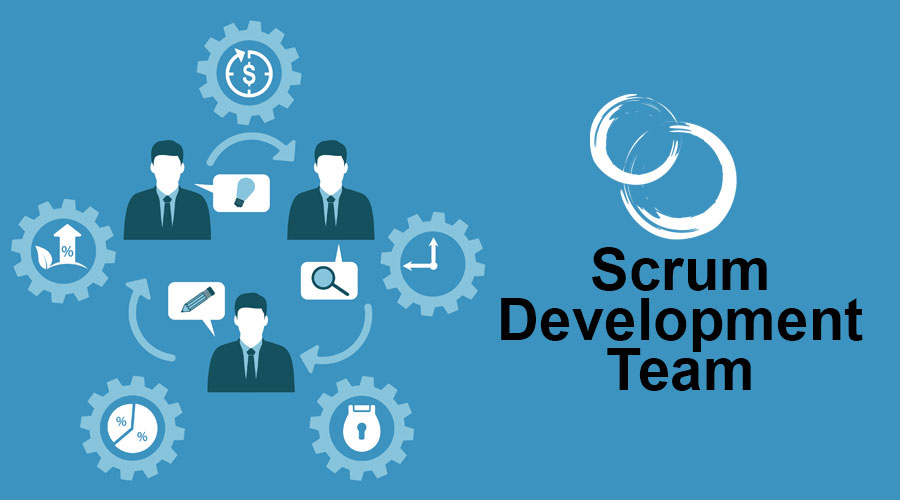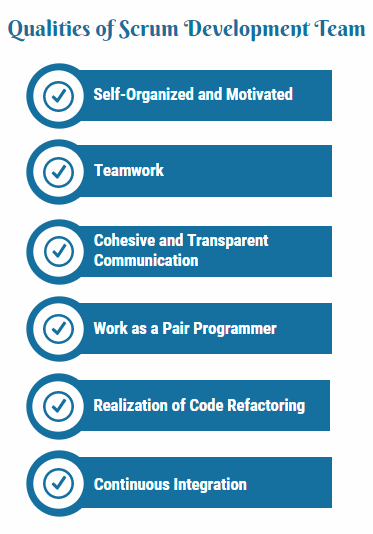Introduction to Scrum Development Team
Scrum is a framework that instigates the Scrum team, including the Product Owner, Scrum Master, and Development team, to work together. Each of the members of the core Scrum team has certain assigned responsibilities. In the Scrum team, the Scrum Master is the facilitator and coach who help team members and others outside the team to understand Scrum values, principles, and practices. On the other hand, the product owner ascertains the transparency of the product backlog item and ensures a similar understanding of the item among team members. Another important member of the Scrum team is the development team who is comprised of developers proficient in different areas of expertise, works together to deliver the committed product increment.
The Scrum development team consist of professionals of various specialized areas including software engineers, architects, programmers, analyst, system admins, QA experts, testers, UI designers, and so on. Generally, it encompasses 5 to 7 members, and it has to be closely knit and cross-functional. A scrum team depends a lot on effective team management, which stimulates the approach of “we” attitude among team members for successful completion of the pre-assigned target.
Essential Qualities of the Scrum Development Team
Some prime qualities are likely necessitated within the scrum development team.
- Self-organized and motivated: Scrum proposes the enhancement of emergent properties within team members, such as self-organized and self-motivation. As if there is no recommendation of the junior-senior hierarchy, the team members have to be held responsible for the work they do and possess the projection on behalf of the client.
- Teamwork: Scrum always encourages a five to nine members team which must be focused and dedicated to the team’s goal. Having a big team is not favorable in the Scrum framework; even multitasking is also not appreciable because of losing focus and commitment from the team’s goal.
- Cohesive and transparent communication: The development team members seem to communicate with one another as well as the product owner and scrum master, so the communication pattern must be fast, cohesive, and transparent.
- Work as a pair programmer: The programmers have to enhance the skill of working as a pair programmer in one workstation while one writes the code and the other reviews each line of the code. The roles are interchangeable also.
- Realization of Code refactoring: Code refactoring means simplifying the code; it is the process of clarifying and making simple existing code without changing its actual attributes. Scrum team members should maintain the code from sprint to sprint with supporting continuous refactoring.
- Continuous integration: Continuous integration (CI) defines the building of a clean build system. The development team constitutes CI to assemble automated compilation, unit test execution, and source control integration.
Key Responsibilities
The development team is one of the important parts of the Scrum team. These are the following key responsibilities performed by the development team in the Scrum framework.
1. Essential Scrum responsibilities
Within the Scrum framework, the development team has to perform certain core responsibilities, such as
- Upholding five primary Scrum values, including focus, commitment, openness, respect, and courage.
- Sticking to budget, schedule, and quality requirements.
- Excelling team spirit through training and mentoring
- Giving recognition to each member and fueling the spirit of team recognition over self-recognition.
- Strives to deliver end-product on time and on quality.
- Creating an environment to accept open and honest feedback.
- Always be prepared to accept challenges.
2. Responsibilities for Sprint
The development team performs all sprint related tasks, including
- Sprint execution: In sprint execution, the development team carries out designing, building, integrating, and testing product backlog items into potentially shippable functionality.
- Daily Scrum: In a daily scrum meeting, each member of the development team participates in gauging their progress level and planning for the current day’s work accordingly.
- Product backlog item: A large part of each sprint spends to focus on creating, refining, estimating, and prioritizing product backlog items.
- Sprint planning: At the beginning of each sprint, the development team participates in the sprint planning meeting. The team members establish a goal for the sprint in collaboration with the product owner and with the facilitation of scrum master.
- Sprint review and Sprint retrospective: At the end of each sprint, the team participates in the Sprint Review and Sprint retrospective. Sprint review emphasizes the product while retrospective focuses on process.
Importance of Team Development
Team development is one of the crucial parts because the end product will be delivered by the team with aligning the goal of the client organization. That is why it is suggested to design team contracts for the team which clarifies the role of each team member, punctuality, and so on. Here, renowned psychologist Bruce Tuckman’s pioneering method of team development can be considered to get a clear view of the importance of team development. Tuckman recommended five phases of group development where each stage is equally important as the other.
- Forming Stage: This is the initial stage where team members are not communicative yet. They are concerned about their assigned tasks and cannot be able to develop skills in interim communication. In this stage, the scrum master takes a crucial role to communicate the objective to team members and mentor the group also.
- Storming Stage: In storming, stage conflicts may arise regarding task distribution and role assignment. Here the scrum master must take the initiative to resolve the conflict in a constructive manner for the greater interest of team development rather than avoiding a trifle issue.
- Norming Stage: At the norming phase, group members are aware of their task, and they develop some norms for task handling in accordance with scrum methodology. They become aware of communication channels also.
- Performing Stage: Now, the team members are aware of their tasks. Self-organization, cooperation, trusts arise within team members, which ensure the team’s productivity. All members work together to achieve the team’s goal, and here the team becomes the actual Scrum development team.
- Adjourning Stage: When the project is completed, the team members reach the adjourning stage, where they meet together to share their collective experiences during the project. Team members must be exhilarated to recount their experiences to get value from them.
The Scrum development team can become the instance of establishing an open, respectful, and honest culture of successful teamwork.
Recommended Articles
This has been a guide to Scrum Development Team. Here we discuss the essential qualities and key responsibilities of the Scrum Development Team. You can also go through our other suggested articles to learn more –




